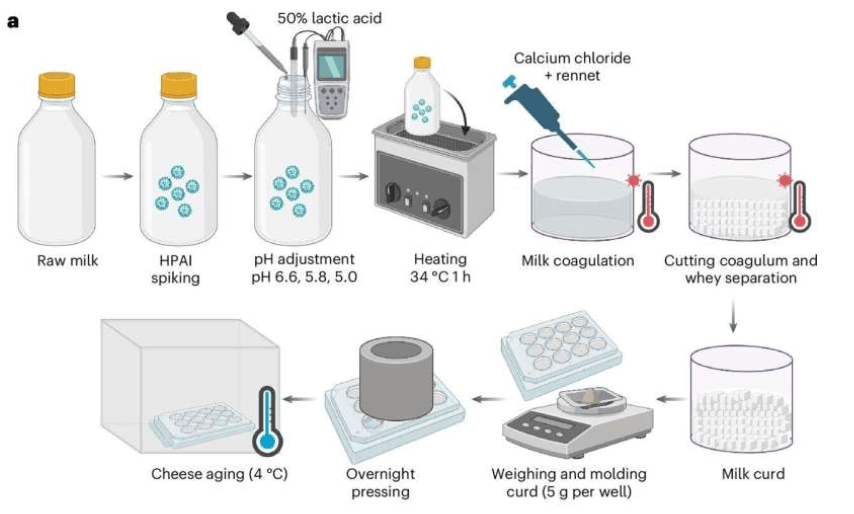The debate around raw milk has resurfaced, but now, a new concern is making headlines—raw milk cheese.
A recent study published in Nature Medicine has revealed that avian influenza (H5N1)—the same virus responsible for the ongoing bird flu outbreak—can survive in raw milk cheese made from contaminated milk.
This discovery brings a crucial message for both healthcare professionals and consumers: even unpasteurized cheese can pose a potential infection risk if made from contaminated sources.
🦠 What the Study Found
Researchers from Cornell University’s College of Veterinary Medicine found that when raw milk contaminated with the H5N1 virus was used to make cheese, infectious virus particles persisted for up to 120 days, even though current U.S. regulations require 60-day aging for raw milk cheeses.
- Cheeses with higher pH (5.8–6.6)—such as cheddar or camembert—still contained viable virus.
- Cheeses with lower pH (below 5)—such as feta, which is more acidic—did not contain detectable virus.
This shows that acidity plays a key role in virus inactivation, but the standard 60-day aging rule alone may not guarantee safety.
🧫 Why This Matters for Public Health
Bird flu infections have traditionally been linked to poultry, but recent outbreaks in cattle herds and milk supplies have raised alarms.
The study reinforces how milk and milk-derived products can become transmission vehicles if contaminated and not properly treated.
While pasteurization effectively kills pathogens, raw milk enthusiasts and artisanal cheese makers often prefer unpasteurized options for their “natural” taste and probiotic profile—unknowingly increasing risk.
For the general population, the takeaway is clear: unpasteurized does not mean safer—it can mean unpredictable.
🧍♀️ Lessons for Doctors in India
For doctors and healthcare educators, especially those in community medicine, pediatrics, and nutrition counseling, this finding is an opportunity to emphasize food safety awareness among patients.
In India, where unregulated dairy markets and raw milk sales are still common, this study is a timely reminder that zoonotic diseases evolve—and so must our preventive communication.
Doctors can:
- Educate patients about the risks of consuming raw or unpasteurized milk products.
- Encourage pasteurized alternatives, especially for children, pregnant women, and the elderly.
- Collaborate with local health departments to spread awareness about emerging food-borne viruses.
🧪 Science in Action—How Researchers Tested It
To test their hypothesis, the Cornell team used H5N1-spiked raw milk to make small lab-based cheese samples with varying acidity levels.
They also examined commercial cheddar samples suspected to have been made with infected milk, and all four tested positive for the virus.
Animal testing on ferrets—which mimic human flu response—showed that while infected raw milk caused illness, raw milk cheese caused none.
This suggests that while cheese may reduce transmission risk, contamination can still carry viable virus under certain pH and temperature conditions.
🧠 What It Means for the Future
This research offers two important lessons:
- Regulations may need updating—60-day aging might not be enough to inactivate viral contaminants.
- Preventive testing and sub-pasteurization could help raw cheese makers balance safety with tradition.
As the bird flu outbreak continues to evolve globally, the food industry, veterinarians, and clinicians must work together to monitor and educate before the virus finds new routes into human populations.
🚀 How The Doctorpreneur Academy Doctors Are Responding
At The Doctorpreneur Academy, we believe that medical awareness should go beyond the hospital.
Our doctors are using digital tools, blogs, and social media to:
- Break down complex medical news into patient-friendly education.
- Share public health alerts that matter to Indian communities.
- Build a network of digitally empowered clinicians who lead with knowledge and communication.
This is how healthcare professionals evolve into doctorpreneurs—bridging science, awareness, and innovation.
💡 Final Takeaway
Raw cheese may seem harmless, but the science is clear—when made from infected raw milk, it can carry more than just flavor.
For healthcare providers, it’s time to re-emphasize food safety as preventive medicine.
And for patients, the safest choice remains simple: pasteurized milk and regulated dairy products.
Inside The Doctorpreneur Academy, doctors are turning insights like this into actionable health communication—ensuring that awareness spreads faster than infection.
👉 Doctor’s Action Step:
Share this insight in your next patient education post or clinic awareness board—one clear message can protect many. 🧠💬
👉 To register for our next masterclass, please click here: https://linktr.ee/docpreneur




